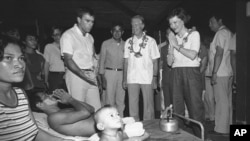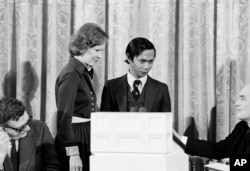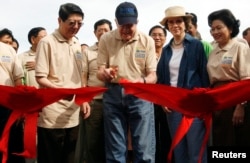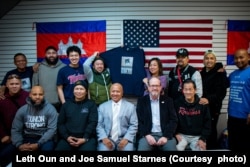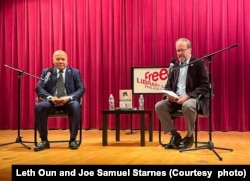When Pol Pot’s murderous Khmer Rouge regime fell in 1979 and the Cambodian Killing Fields period ended, hundreds of thousands of starving, homeless Cambodians in search of shelter and food streamed through land-mine filled paths toward Thailand. President Jimmy Carter asked First Lady Rosalynn Carter to travel there and survey the situation. She wrote of her visit to a Thai refugee camp in her 1984 memoir, First Lady from Plains, that nothing “had prepared me for the human suffering I saw.” Carter, who died on Nov. 19 at the age of 96, described refugees “lying on the ground, on mats or dirty blankets or rags. All were ill and in various stages of starvation—some all bones and no flesh, others with stomachs swollen as though to burst and with cracked feet. All had malaria, dysentery, or tuberculosis, and were retching, feverish, and silent.”
Carter, who held an emaciated baby that died soon after, returned home moved by the need and rallied her husband’s administration to expand its support of Cambodian refugees. She lobbied the UN and helped form the National Cambodia Crisis Committee, which focused efforts of many people and organizations to care for and help resettle refugees, including approximately 150,000 Cambodians who immigrated to America.
Leth Oun—who would one day become a U.S. Secret Service officer and protect presidents, first ladies, and vice presidents in four administrations—was a 13-year-old Cambodian refugee at the time of Rosalynn Carter’s visit. He and his mother and older sister, Dy, were living in a makeshift refugee camp in Cambodia just beyond the Thai border. Leth’s father, a lieutenant in the Cambodian army, had been executed four years earlier in the first days of the Khmer Rouge’s reign in April 1975. Leth and his mother and older sister had barely survived the hard labor and the horrors of the Killing Fields, a period in which about two million—almost a quarter of the country’s population—died from execution, starvation, and disease.
About four months after Carter’s visit, Leth’s family would be rescued by UN relief workers and moved into Thai refugee camps. Following almost four years in a series of camps, they were selected to immigrate to the U.S. Leth arrived in 1983 and spent seventeen years in Maryland and then Philadelphia striving to learn English, starting a family, and working multiple low-wage jobs while earning degrees from Community College of Philadelphia and Widener University. He landed a job as a corrections officer with the Department of Justice in 2000, and two years later, he became an officer in the U.S. Secret Service’s Uniformed Division. Last month, he retired after more than two decades of protecting the leaders of the country that gave him a home.
I learned about Rosalynn Carter’s efforts on behalf of Cambodian refugees late in the process of coauthoring Leth’s memoir, A Refugee’s American Dream: From the Killing Fields of Cambodia to the U.S. Secret Service, which Temple University Press published in February and Tantor Media released as an audiobook in October. Leth was not previously aware of her efforts on behalf of Cambodians either, but he and I are not alone—although it was a national news story at the time, Carter’s historic trip and her support of Cambodians is not widely remembered. At the time, it was overshadowed by the takeover of the U.S. embassy in Iran, which began the same day Carter decided to travel to Thailand.
Carter wrote that when she held the baby that would soon die, she thought back to holding her own daughter, Amy, and tears welled up in her eyes. “I thought about our country and how little we realize the suffering and distress and grief in the world.”
I’ve had a similar realization in learning Leth’s story over the six years I spent working on his memoir. Leth and I are four months apart in age, but our childhoods could not have been more different. In the summer of 1976, when he and I were both nine years old, I wore a T-shirt celebrating the U.S. bicentennial while playing tennis and going to the swimming pool in my hometown of Cedartown, Georgia. I enjoyed all the hot dogs and ice cream I could eat. Leth was working seven days a week in rice paddies. To supplement the one watery bowl of rice soup served daily, he ate bugs, rats, and wild mushrooms. His childhood, as he told me recently, was stolen. Mine, I see clearly now, was blessed.
His story has transformed my view of the world. I’ve joined Leth in committing to donate any money we make from his book to charitable efforts in Cambodia. It’s a pittance compared to the need, but I am inspired by his resilience and Rosalynn Carter’s caring, whose message is that we who have so much should do what we can to help those who have so little. Leth, who marked four decades living in this country in October, might not be where he is today had it not been for the First Lady’s efforts 44 years ago.
Joe Samuel “Sam” Starnes is a writer living in Haddon Township, New Jersey. For more about Leth Oun, visit lethounbook.com.




